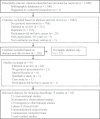Use of geriatric assessment for older adults in the oncology setting: a systematic review
- PMID: 22851269
- PMCID: PMC3413614
- DOI: 10.1093/jnci/djs285
Use of geriatric assessment for older adults in the oncology setting: a systematic review
Abstract
Background: Geriatric assessment is a multidisciplinary diagnostic process that evaluates the older adult's medical, psychological, social, and functional capacity. No systematic review of the use of geriatric assessment in oncology has been conducted. The goals of this systematic review were: 1) to provide an overview of all geriatric assessment instruments used in the oncology setting; 2) to examine the feasibility and psychometric properties of those instruments; and 3) to systematically evaluate the effectiveness of geriatric assessment in predicting or modifying outcomes (including the impact on treatment decision making, toxicity of treatment, and mortality).
Methods: We searched Medline, Embase, Psychinfo, Cinahl, and the Cochrane Library for articles published in English, French, Dutch, or German between January 1, 1996, and November 16, 2010, reporting on cross-sectional, longitudinal, interventional, or observational studies that assessed the feasibility or effectiveness of geriatric assessment instruments. The quality of articles was evaluated using relevant quality assessment frameworks.
Results: We identified 83 articles that reported on 73 studies. The quality of most studies was poor to moderate. Eleven studies examined psychometric properties or diagnostic accuracy of the geriatric assessment instruments used. The assessment generally took 10-45 min. Geriatric assessment was most often completed to describe a patient's health and functional status. Specific domains of geriatric assessment were associated with treatment toxicity in 6 of 9 studies and with mortality in 8 of 16 studies. Of the four studies that examined the impact of geriatric assessment on the cancer treatment decision, two found that geriatric assessment impacted 40%-50% of treatment decisions.
Conclusion: Geriatric assessment in the oncology setting is feasible, and some domains are associated with adverse outcomes. However, there is limited evidence that geriatric assessment impacted treatment decision making. Further research examining the effectiveness of geriatric assessment on treatment decisions and outcomes is needed.
References
-
- Jemal A, Siegel R, Xu J, Ward E. Cancer statistics, 2010 CA Cancer J Clin. 2010;60 (5):277– 300 - PubMed
-
- Canadian Cancer Society’s Steering CommitteeCanadian Cancer Statistics 2011Toronto: Canadian Cancer Society; 2011;
-
- Smith BD, Smith GL, Hurria A, Hortobagyi GN, Buchholz TA. Future of cancer incidence in the United States: burdens upon an aging, changing nation J Clin Oncol. 2009;27 (17):2758– 2765 - PubMed
-
- Extermann M, Aapro M, Bernabei R,, et al. Use of comprehensive geriatric assessment in older cancer patients: recommendations from the task force on CGA of the International Society of Geriatric Oncology (SIOG) Crit Rev Oncol Hematol. 2005;55 (3):241– 252 - PubMed
-
- Balducci L, Yates J. . General guidelines for the management of older patients with cancer. Oncology. 2000;14 (11A):221– 227 - PubMed
Publication types
MeSH terms
Grants and funding
LinkOut - more resources
Full Text Sources
Other Literature Sources


